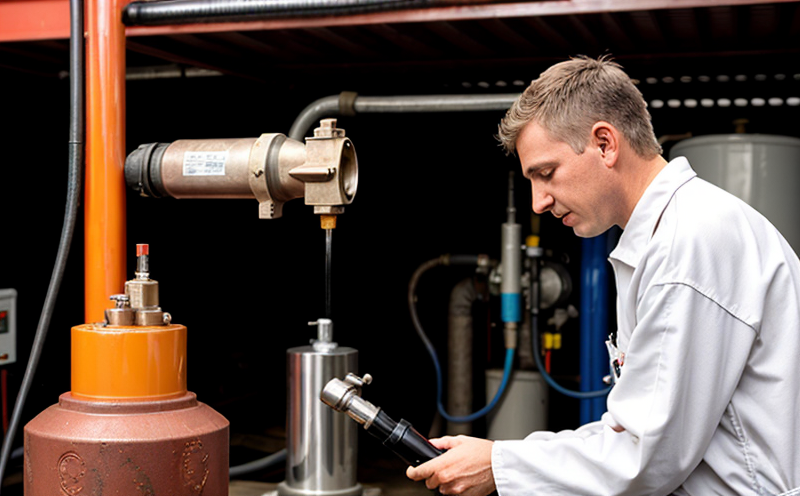ASTM D5185 Elemental Analysis of Aviation Lubricants (ICP)
The ASTM D5185 test method is a critical analytical technique for the elemental analysis of aviation lubricants using Inductively Coupled Plasma Spectroscopy (ICP). This service ensures that aviation lubricants meet stringent quality and performance standards, which are essential for the safe operation of aircraft. Elemental composition plays a crucial role in determining the efficiency, durability, and safety of these fluids.
Aviation lubricants such as engine oils, hydraulic fluids, and greases must be free from harmful impurities that could lead to degradation or failure during critical operations. The ASTM D5185 test method allows for the detection of trace elements like copper (Cu), iron (Fe), nickel (Ni), chromium (Cr), and others, which may indicate contamination or provide insights into wear mechanisms within engines.
The ICP technique used in this service involves atomizing the sample lubricant and introducing it into a plasma torch. The atoms are then excited by microwave energy to emit light at specific wavelengths corresponding to various elements present in the sample. This method provides high sensitivity, accuracy, and precision, making it suitable for detecting even trace amounts of elements.
For accurate results, proper specimen preparation is crucial. Samples should be carefully selected and prepared according to ASTM D5185 guidelines, ensuring that they are representative of the lubricant being tested. This typically involves dissolving a small amount of the lubricant in an appropriate solvent before analysis.
The test method specifies detailed procedures for calibration, standardization, and quality control measures to ensure consistent and reliable results. Compliance with these protocols ensures that the laboratory's findings meet international standards, such as those set by ASTM D5185 itself.
This service is particularly valuable for quality managers, compliance officers, R&D engineers, and procurement professionals within the aerospace industry who need to verify the purity and performance of aviation lubricants. By adhering to this rigorous testing process, they can ensure that their products meet strict regulatory requirements and perform reliably under demanding conditions.
For more information on how our laboratory performs ASTM D5185 elemental analysis using ICP, please contact us directly. Our team of experts is ready to assist you with any inquiries or requests for detailed reports.
Industry Applications
| Application | Description |
|---|---|
| Aircraft Engine Maintenance | Monitoring wear and tear of engine components by detecting elements indicative of friction or erosion. |
| Routine Quality Control | Ensuring compliance with aviation lubricant specifications to prevent performance issues in engines and other systems. |
| New Product Development | Determining the elemental composition of new formulations to optimize their properties for specific applications. |
| Contamination Detection | Identifying potential contaminants that could compromise lubricant performance and increase operational risks. |
- Aircraft engine manufacturers
- Airlines and aviation maintenance organizations
- R&D departments focusing on aerospace engineering
- Regulatory compliance with international standards like ASTM D5185
- Safety enhancement through accurate elemental analysis of lubricants
International Acceptance and Recognition
The ASTM D5185 test method for elemental analysis of aviation lubricants using ICP is widely recognized and accepted by regulatory bodies, industry standards organizations, and major aerospace companies around the world. Compliance with this standard ensures that laboratory results are credible and universally applicable.
Many international organizations such as the International Organization for Standardization (ISO), the European Committee for Standardization (CEN), and others have incorporated ASTM D5185 into their own standards, reflecting its importance in ensuring consistent quality across different regions. This recognition underscores the reliability of our laboratory's services.
Our expertise in performing ASTM D5185 tests aligns with global best practices, providing clients with confidence that they are receiving accurate and actionable data about their aviation lubricants' elemental composition.
Environmental and Sustainability Contributions
- Reduction of waste through precise measurement and control of lubricant usage, minimizing unnecessary replacements or overhauls.
- Promotion of sustainable manufacturing practices by ensuring that only the optimal amount of materials are used in product formulations.
- Enhancement of operational efficiency and safety, which contributes to reduced carbon emissions from aircraft operations.
- Avoidance of harmful environmental impacts caused by improper disposal or use of contaminated lubricants.
- Potential for cost savings due to improved resource utilization and extended equipment life cycles.
By adhering to ASTM D5185 elemental analysis, we contribute to the broader goals of sustainability in the aerospace industry. This service supports efforts towards reducing environmental impact while maintaining the highest standards of product quality.





